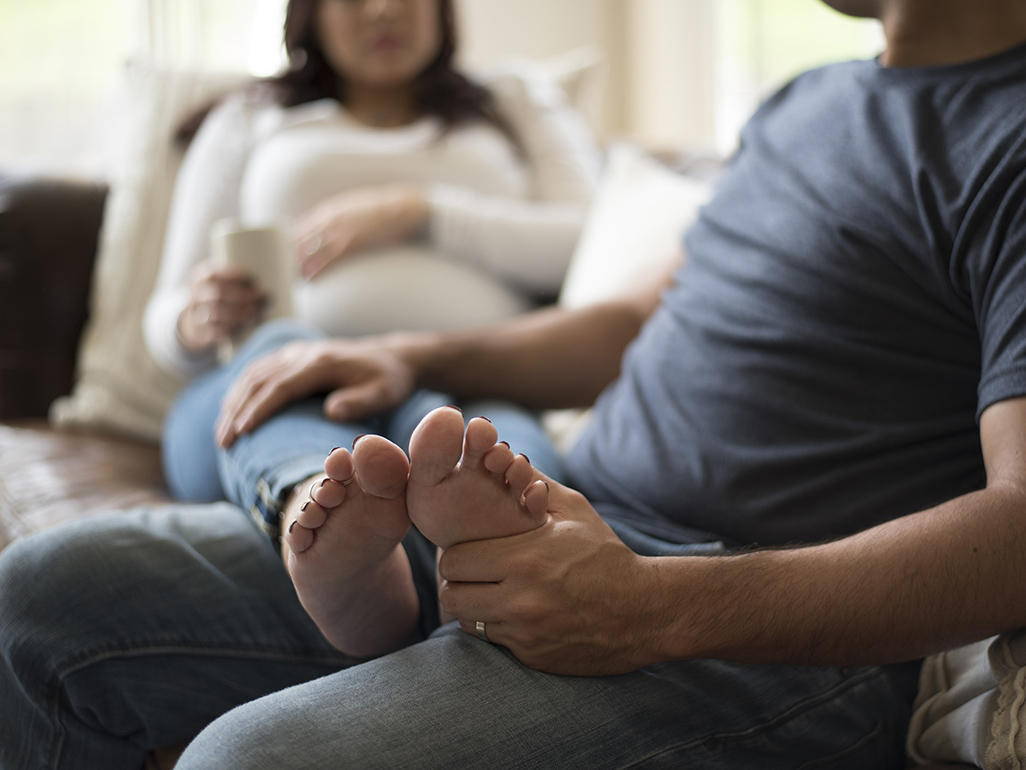What causes this to happen, anyway?
When can you expect your feet to start puffing up? Well, the good news is that it’s usually later on in pregnancy. So you’ll likely recognize your feet for the first half or more of your pregnancy.
Various factors contribute to foot and ankle swelling during pregnancy. For starters, your body retains more fluid during pregnancy. Also, your growing uterus puts pressure on your veins, which impairs return of blood to your heart. Hormonal changes also play a role.
First trimester
Rapidly increasing levels of the hormone progesterone (literally “pro gestation” or “pro pregnancy”) slow your digestion down. This can cause abdominal bloating long before you have a noticeable baby bump.
You may also notice a bit of puffiness in your hands, feet, or face — but not much.
If you notice a lot of swelling this early on, especially if accompanied by other symptoms such as dizziness, headaches, or bleeding, it’s best to call your doctor or birthing professional, such as a midwife.
Second trimester
The second trimester begins with week 14 of pregnancy, roughly the start of month 4. It’s not unusual to start noticing swollen feet around month 5 of pregnancy, especially if you’re on your feet a lot or the weather is hot.
This swelling is due to the increasing volume of blood and fluids in your body. Your blood volume increases by about 50 percent during the course of your pregnancy, and that’s paired with a lot of hormonal fluid retention.
While it may make your rings and shoes a little snug, all this extra fluid helps to soften your body and prepare it for giving birth — and that’s exactly what you want. Rest assured, the extra fluid will rapidly decrease in the days and weeks after your baby is born.
Third trimester
Starting with week 28 of pregnancy, the third trimester is by far the most common time to experience swollen feet.
Especially as the weeks go on and you get closer to week 40, your toes are more likely to resemble little sausages than anything else (yes, becoming a parent is glamorous).
Your body is continuing to build its supply of blood and fluids, which can contribute to swelling. Your uterus is also getting much heavier as your baby grows, which can slow blood flow from the legs back to the heart. (Don’t worry, this isn’t dangerous — just uncomfortable.)

Other factors that can contribute to swollen feet include:
- hot weather
- dietary imbalances
- caffeine intake
- not drinking enough water
- being on your feet for long periods of time
Foot and ankle swelling during pregnancy is common and usually goes away after delivery. In the meantime, it might help to:
- Stay off your feet. Avoid standing for long periods. When you can, sit with your feet up and occasionally rotate your feet at the ankles and gently flex your feet to stretch your calf muscles. Better yet, lie down with your legs elevated.
- Sleep on your left side. This takes pressure off the large vein that returns blood from the lower half of your body to your heart (inferior vena cava). It also might help if you elevate your legs slightly with pillows.
- Wear compression stockings. Your health care provider might recommend wearing supportive tights or stockings during the day.
- Be physically active every day. Take walks, ride a stationary bike or swim laps in a pool.
- Stand or walk in the pool. Although there's little research on the use of water pressure for foot and ankle swelling, standing, or walking in a pool seems to help compress tissues in the legs and might provide temporary relief from swelling during pregnancy.
- Wear loose clothing. Tight clothing can restrict blood flow. Don't wear socks or stockings with tight bands on the ankles or calves.
Some research suggests that foot massage and reflexology, which involves applying pressure to certain areas of the feet, hands, and ears, might help decrease foot and ankle swelling during pregnancy. Also, swelling doesn't mean cutting back on how much you drink. The Institute of Medicine recommends about 10 cups (2.4 liters) of fluids a day during pregnancy.
Although mild foot and ankle swelling during pregnancy is normal, sudden swelling that is painful — especially if it's in one leg only — could be an indication of a blood clot (deep vein thrombosis). A sudden increase in swelling also might mean that your blood pressure is higher than normal. Both conditions require prompt evaluation and treatment.

